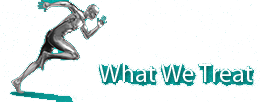What We Treat
Achilles Tendon
The Achilles Tendon forms the attachment of the main large muscles in the calf (Gastrocnemius and Soleus) to the back of the heel.
These muscles are very strong and are involved when we walk, run, jump and stand. A minor strain or repetitive overuse can cause pain at the back of the ankle, while the worst case scenario is for the tendon to rupture completely.

As with many tendons it is encased in a protective sheath and has a small fluid sack, called a bursa, which prevents it from rubbing against the back of the heel bone.
Repetitive overuse, such as climbing stairs, a minor muscle strain, or direct irritation from the back edge of poorly fitting footwear can cause inflammation in the tendon itself (tendonitis), the protective sheath (tenosynovitis) or the bursa (bursitis).
The area is usually swollen and tender to touch, or may become locally hot or red. There is usually some pain or discomfort when doing activities in weight bearing as a result.
Use of a Rest Ice Compression Elevation (or RICE) regime along with soft tissue manipulation and local electrotherapy will often resolve the problem.
On occasion the Achilles will rupture completely, often without any warning or prior problems. It usually happens with a sudden pushing off movement whilst playing something like squash or netball.

More often than not a loud ‘pop’ is heard and the person turns round to see who has just hit them on the back of the leg. They are unable to actively point their toes downwards or to weight bear.
This severity of injury will need assessing in hospital and may be dealt with surgically or not. In either case a prolonged period of immobilisation in a long leg plaster is necessary, initially with the toes pointing down. Over the weeks the position of the foot is altered, lengthening the tendon as it heels.
After several weeks in plaster the ankle joint is usually very stiff and the leg muscles, especially the calf, are very weak. A period of rehabilitation is then necessary to regain movement, strength and function.


